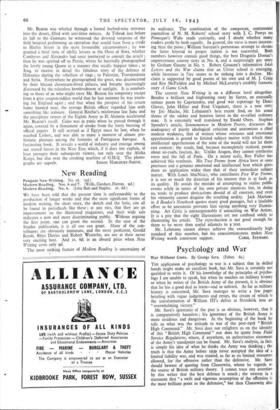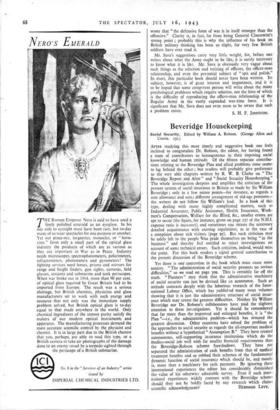Psychology and War
War Without Guns. By George Sava. (Faber. 6s.)
THE application of psychology to war is a subject that in skilled hands might make an excellent book, but Mr. Sava is certainly not qualified to write it. Of his knowledge of the principles of psycho- logy I am unable to speak, but when he touches on military history or when he writes of the British Army of the present, it is obvious that he has a good deal to learn—and to unlearn. As far as military history is concerned, Mr. Sava manages to write a few pages bristling with vague judgements and errors, the cream of which is the transformation of William III's defeat at Steenkirk into an " overwhelming victory."
Mr. Sava's ignorance of the past is so obvious, however, that it is comparatively harmless ; his ignorance of the British Amy is more insidious and dangerous. At the beginning of the book he tells us what was the attitude to war of the post-1918 " British High Command." Mr. Sava...does not enlighten us on the identity of this " British High Command " nor does he quote from Field Service Regulations, where, if anywhere, an authoritative statement of the Army's standpoint can be found. Mr. Sava's analysis, in fact, is simply his idea of what he thinks the Army was thinking ; the truth is that the Army before 1939 never accepted the idea of a limited liability war, and was trained, as far as its limited resources allowed, for • the offensive rather than the defensive. Mr. Sava should beware of quoting from Clausewitz, whom he regards as the source of British military theory. I cannot trace any assertion by this writer that the best defence is attack ; the nearest is a statement that " a swift and vigorous assumption of the offensive is the most brilliant point in the defensive," but then Clausewitz also
wrote that " the defensive form of war is in itself stronger than the offensive." Clarity is, in fact, far from being General Clausewitz's strong point ; probably this is why the influence of his book on British military thinking has been so slight, for very few British soldiers have ever read it.
Mr. Sava's suggestions carry very little weight, for, before one writes about what the Army ought to be like, it is surely necessary to know what it is like. Mr. Sava is obviously very vague about such things as the selection and training of officers, the officer-man relationship, and even the perennial subject of " spit and polish." In short, this particular book should never have been written. Its subject, however, is of great interest and importance, and it is to be hoped that some competent person will write about the many psychological problems which require solution, not the least of which is the difficulty of reproducing the officer-man relationship of the Regular Army in the vastly expanded war-time force. It is significant that Mr. Sava does not even seem to be aware that such a problem exists.
S. H. F. JOHNSTON.



























 Previous page
Previous page